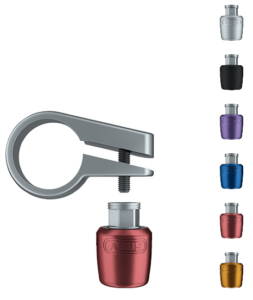ABUS NutFix is the new and stylish solution for securing bicycle components. The NutFix system protects both wheels and the seat against would-be thieves.

Find it: Available at Bike Shops
Price: $35-$70 USD
NutFix is the new and stylish solution for securing bicycle components. The NutFix system protects both wheels and the seat against would-be thieves. The nut is fitted with an outer casing mechanism that only reveals the screw below when the bike is on its side. This means it is not possible to access the screw to remove the wheels or seat unless you position the bike on its side. The anodized surfaces of the caps, available in a range of colours, provide long-term protection against corrosion. The NutFix system comes in three different varieties listed below. I reviewed the NutFix Axle-Set and NutFix SPC.

The NutFix Axle-Set
Works with 100 and 135mm hollow axle (quick release) wheels and requires a 8mm wrench to tighten the nut. The NutFix Axle-set are sold in pairs for $70 or individually (front or rear) for $35 each.

The NutFix
Works with 3/8″, M9, and M10 solid axle wheels and requires a 15mm spanner to tighten the nut. The Nutfix is sold for $35 a set.

The NutFix SPC
Works with the following seatpost collar sizes; 28.6, 30.0 31.8 & 34.9mm and requires a 8mm spanner. The NutFix SPC retails at $45.
Tell Your Friends:
We all know that feeling when you leave your bike locked around the city. The feeling that when you return all that could be left is a skeleton of your bike. ABUS’ Nutfix system is a sleek solution to this worry. Your wheels and seatpost are locked in place, helping you ward off the most common threat of bike theft. This solution not only works but is easy to install. No specialty tools needed and minimal bike knowledge required. Just follow the easy to understand instructions provided and in five minutes or less peace of mind prevails.
ABUS does a great job of combining functionality with great design and the NutFix is no exception. Everybody wants their bike to look nice and with a range of colours too choose from NutFix is both stylish and secure.
https://www.youtube.com/watch?v=zyLQebnDnno
Wish list:
This product does a great job serving its intended function. I do wish the outer casing was a bit smaller and more discreet looking but that’s me being picky.
Summary:
NutFix is a great way to deter a passing thief or opportunist. As long as they don’t know the trick and your bike is positioned vertically there is no way to loosen your seat clamp or wheel skewer.
The NutFix system relies on gravity to work and operates very smoothly. Only a couple times when trying to lift the outer casing did I have to give it a little wiggle before the mechanism worked. When the bike is vertical the outer case spins freely and covers the internal nut making it inaccessible and impossible to loosen. You can reef on it and try to loosen it all you want but as far as my efforts went the NutFix system cannot be successfully attacked.
Once the bike is on it’s side the outer case can be easily lifted to reveal the inner nut. The bike can be lifted back into a vertical position with the internal nut still exposed but as soon as you push the outer casing in while upright it’s locked in place.
Depending on the size of your lock and the type of bike rack your locked to a thief can still maneuver the bike into a sideways position. I don’t see this as a major concern though as it’s awkward to do and tough to ignore by any passerby.
If you’re sick of carrying around the weight of multiple locks this is a great solution. The NutFix keeps your components secure so your Brooks saddle doesn’t unknowingly end up for sale on craigslist.
Get your FREE copy of: Momentum Mag's Bike Lock Guide
In this guide, we share stats on bicycle theft, the best ways to lock your bike and which ways to avoid, types of locks to use, new technologies combating theft, a directory of brands and much more!
Thank you for your submission. Please check your inbox to download the guide!











and?
I can’t believe actually anyone is purchasing this. If you buy a nice Brooks
or nice wheels, it looks so much better if you use something like Hexlox instead.
Comments are closed.